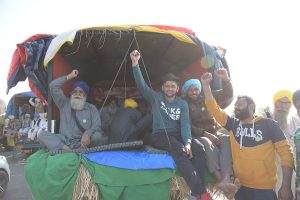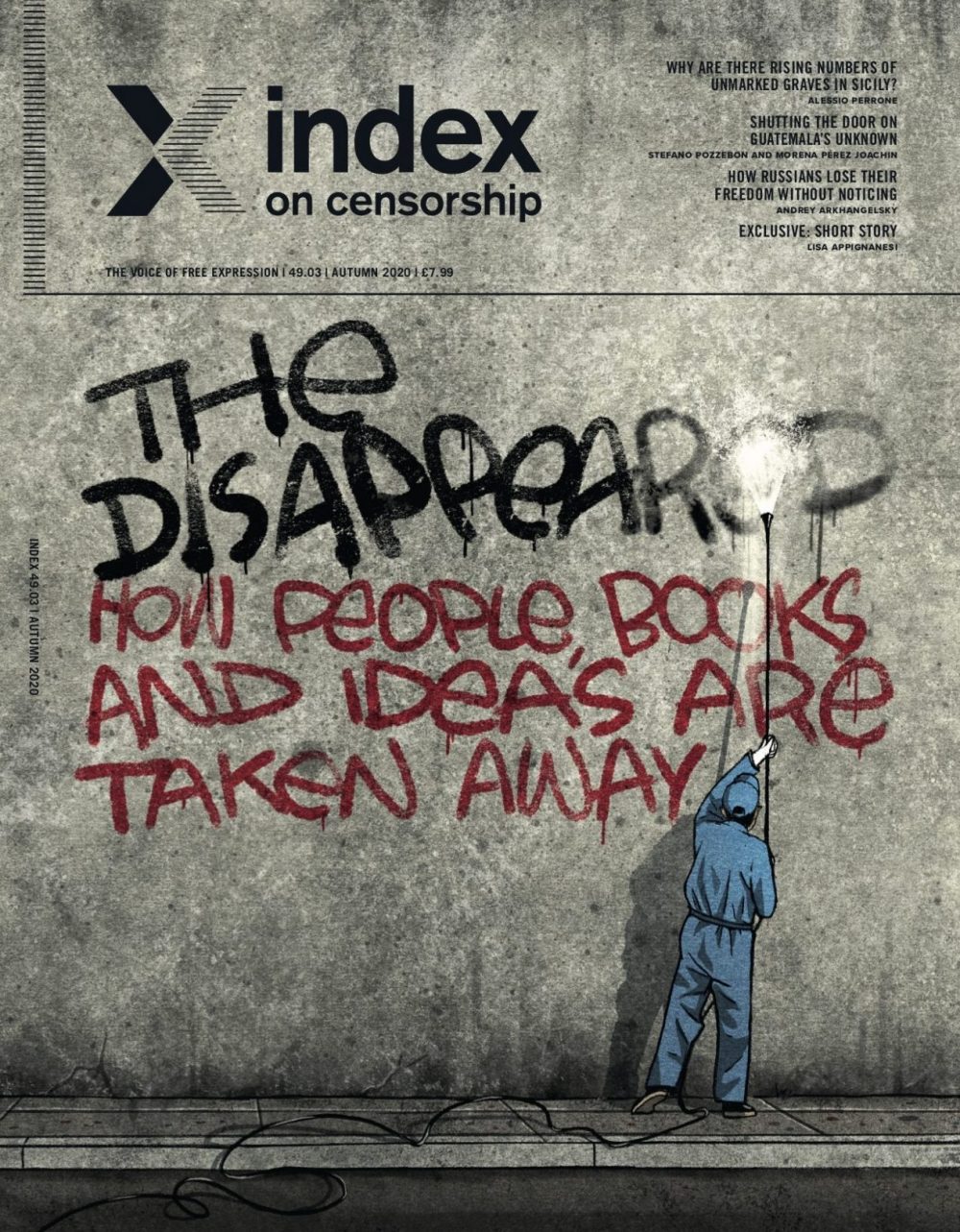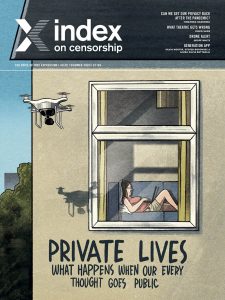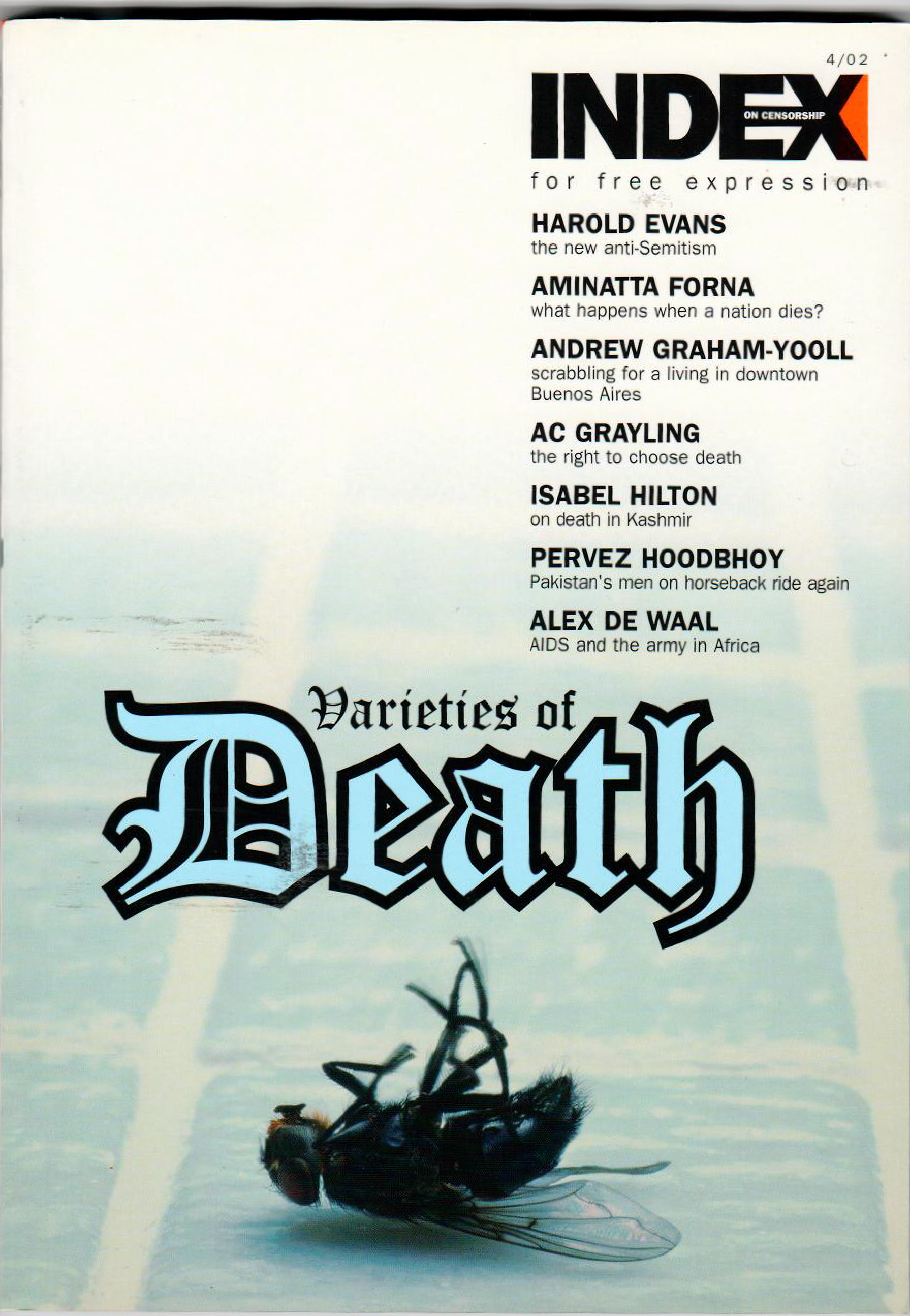4 Feb 2021 | India, News
[vc_row][vc_column][vc_column_text]

Farmers protesting/Randeep Maddoke/WikiCommons
India is currently witnessing one of its longest and largest ever expressions of dissent. Farmers – protesting three laws passed in September by the central government – have been camping at the borders of the national capital since 26 November last year, challenging the powers in New Delhi.
The protests would seem, on the surface, to show that India is functioning as a democracy with the freedom of individuals to protest. It is therefore ironic that at least seven journalists have been booked for reporting on the events that have transpired during the clashes between police and authorities.
On 29 January , six prominent journalists – Rajdeep Sardesai, Mrinal Pande, Zafar Agha, Vinod Jose, Paresh Nath and Anant Nath – were booked by Uttar Pradesh and Madhya Pradesh police under charges of sedition, criminal conspiracy and promoting enmity.
A day later, freelance journalist Mandeep Punia, who was on a project for The Caravan magazine, was detained by the Delhi police, a few hours after he went live on Facebook and reported on how stones were pelted at the farmers at Singhu border, even as security personnel looked on. He has since been granted bail.
Based on eyewitness testimony during a rally by the protesting farmers on Republic Day, 26 January, when India celebrates the 1950 entry into force of its Constitution, The Caravan reported that a man was killed after being shot by the Delhi police. Sardesai, Pande and Agha’s tweets echoed the testimony.
Police have vehemently denied shooting the farmer, which they claim is backed up by an autopsy report. However, the man’s family has refused to accept the Delhi police’s claim. “The doctor even told me that even though he had seen the bullet injury, he can do nothing as his hands are tied,” the farmer’s grandfather told Indian news website The Wire.
Siddharth Varadarajan, founding editor of The Wire, was booked by the Uttar Pradesh police for tweeting the police report of the incident.
While the controversy around the farmer’s death is far from settled, the government’s decision to go after these journalists is only the latest episode of its effort to gag the voices that have dared to question it.
The question arises, why would the central government of the largest democracy in the world choose to take these steps? This was answered by the secretary general of the Press Club of India during a meeting organised to protest the intimidation of journalists covering the protests.
“The government is sending a message that while on paper we’re a democracy, we are behaving like several undemocratic states of the world,” Anand Kumar Sahay said.
The statement encompasses almost everything that journalists in India, who are not toeing the line yet, deal with as they try to speak truth to powerful authorities. India lies 142nd on Reporters Without Borders’ world press freedom rankings.
RSF says: “Ever since the general elections in the spring of 2019, won overwhelmingly by Prime Minister Narendra Modi’s Bharatiya Janata Party, pressure on the media to toe the Hindu nationalist government’s line has increased.”
That a large number of journalists are being booked, arrested or assaulted for doing their job just around these farmers’ protest tells a worrying story. A more thorough examination of the cases, with focus on the organisations that these journalists represent and the ideology that they support, will show whether Modi is targeting just the critical media or journalism as a whole.
There are also more covert ways in which the far-right party that governs the Indian state has told news establishments to not speak out against them if they want to preserve their business.
The mainstream news organisations in the country typically function on an advertisement-based revenue model. While this has helped in keeping the cost of the national dailies low, it has also made them dependent on large corporations and the government, the two biggest advertisers in newspapers.
As expected, the government has not missed the opportunity to milk this dependency and has led many media organisations to indulge in self-censorship and push the government agenda forward, particularly during the Covid pandemic when government advertising has increased.
While there is ample evidence of censorship by the Indian government on independent news websites like Newslaundry, it was also hinted at by the Modi in an interview with prominent English daily The Indian Express, in the run-up to Assembly Elections 2019.
In the article, Modi talks about the PM-KISAN income support or ‘dole’ scheme for farmers and compares this with payments received by other sectors from the government, such as publishing.
“I give advertisements to the Indian Express. It doesn’t benefit me, but is it a dole? Advertisements to newspapers may fit into a description of dole,” Modi said.
Media organisations are therefore on a warning by the government.
The close government scrutiny had also become clear back in 2018, when anchor Punya Prasun Bajpai was forced out from ABP News.
In a detailed account of the reasons behind his departure, Bajpai described how the channel’s proprietor had told him to avoid mentioning Modi’s name in the context of any criticism of the government.
Bajpai also described a 200-member monitoring team that was involved in observing news channels resulting in directives that would be sent to editors about what should be showed and how.
These “commandments”, which were reserved for TV news and large national dailies until 2019, have now reached the digital versions of these conventional news organisations. The only journalistic outfits who have dared to critically examine this government’s rule operate as digital platforms. The government is thus looking to “regulate” their work as well.
Censorship of content that is consumed by millions has not existed before on this scale.
But it has now permeated the Indian media to such an extent that freshers starting work in media are being told to “ride the tide” and “reserve their optimism” for when the political environment is less volatile.
[/vc_column_text][/vc_column][/vc_row][vc_row][vc_column][three_column_post title=”You may also like to read” category_id=”5656″][/vc_column][/vc_row]
15 Oct 2020 | China, India, News, Pakistan
[vc_row][vc_column][vc_column_text]The Indian government’s revocation of autonomy for Jammu and Kashmir has been a disaster for free speech.
In October 2019, Narendra Modi’s government rescinded article 370 of the Indian constitution which had given the region special autonomous status since 1954. The region is now run as two separate union territories – Ladakh, and Jammu and Kashmir.
Ever since its autonomy was curtailed, access to information for inhabitants has been greatly reduced.
Despite palpable risks to their safety, journalists in the disputed region have remained, but a lack of access to internet has hindered their progress.
Set in the Himalayas, the region is famously beautiful – often described as “heaven on Earth” – but this is in stark contrast to the fierce and often bloody dispute wracking Jammu and Kashmir.
As the situation worsens, we look back at pieces published in Index magazine and online exploring the impact the conflict has had on free speech, journalists and the people who call Kashmir their home.

Varieties of death, the winter 2002 issue of Index on Censorship magazine.
Journalist and broadcaster Isabel Hilton visited Kashmir in the early 2000s. She documented her experiences in 2002 and spoke of her encounters with Pakistani military.
The piece is an insight into how much of major conflicts can seem underreported, but in fact are not. For journalists working in the region, the daily reports of death tolls and atrocities are both a livelihood and a duty, but only major events tend to make headline news across the world.
She wrote: “In Srinagar, the journalists — themselves constantly threatened and often attacked by both sides — have grown weary of looking for new angles on death. Only the larger outrages — such as the car bomb attack on Srinagar’s assembly building on 1 October last year which claimed more than 30 lives — are reported internationally.”

Index on Censorship autumn 2020 issue on the theme of the disappeared
In the most recent edition of Index (which can be read here), Bilal Ahmad Pandow discussed the experiences of journalists in Kashmir.
Since India took control and imposed direct rule, a feeling of (relative) security in the region has been lost and censorship laws have taken a firm grip, he writes.
A new policy for journalists introduced this year by the Jammu and Kashmir government imposes rules on restricting “fake news, plagiarism and unethical or anti-national content”.
“Pressure on media freedom was ratcheted up even further with the introduction of the New Media Policy 2020. Journalists were, of course, already operating under tremendous pressure – harassment, intimidation, the choking of advertisement revenue, imprisonment, draconian laws and a communication blockade – all of which are forcing journalists to self-censor.”

Index on Censorship summer 2020 issue on the theme of privacy
Earlier this year, Kashmiri journalist Bilal Hussain spoke with Index’s Orna Herr on life in the media in the region.
He told Herr of his personal struggles to get copy and videos past online restrictions and out of the country. Journalists have been creative in their attempts to get past the internet blocks designed to limit media freedom, he said.
“Since March 2020, the government allowed restricted internet access that blocked many news websites. So journalists installed VPNs that could break the firewall and enabled journalists to access those websites.”
“Some journalists used to travel to Delhi to access the internet and came back after filing their reports.”
“To get video interviews to my editor in Paris, I put them on a memory stick and gave it to a friend who was travelling to the USA, and he sent it on from there.”

Varieties of death, the winter 2002 issue of Index on Censorship magazine.
Poet Agha Shadid Ali was born in Kashmir in 1949. He moved to the USA in 1976 but his home was always at the forefront of his literary works.
His 1997 work Country Without a Post Office discussed the plight of Kashmir. At the time of their publication, he said: “My entire emotional and imaginative life began to revolve around the suffering of Kashmir.”
Ali died of brain cancer in 2001. Index included two of his poems following the 2002 Kaluchak massacre in which militants attacked a tourist bus, killing 31 people and injuring 47.
[/vc_column_text][/vc_column][/vc_row][vc_row][vc_column][vc_column_text]

Media moguls & megalomania, the September 1994 issue of Index on Censorship magazine
This piece from 1994 by Caroline Moorehead shows how the human rights spotlight was finally being turned onto Jammu and Kashmir.
She writes: “In their war against the militants…the Indian police and security fores have come to treat disappearances with a combination of lethargy, obfuscation and threats, connived at by the judiciary. Court orders are ignored, relatives warned to stop making enquiries, and the case is shifted from place to place while documents are mislaid and those responsible posted to other places.”
It tells the story of the disappearance of 22-year-old Harjit Singh, a far from unusual story in the region.[/vc_column_text][/vc_column][/vc_row][vc_row][vc_column][vc_column_text]

Varieties of death, the winter 2002 issue of Index on Censorship magazine.
Beyond the Gun is a collection of photographs and statements from Kashmiri people in 2002. Its emotive language and testimony from residents who felt betrayed by India’s handling of the region, coupled with photographs of members of the community, make for a stirring read.
By Sheba Chhachhi, each photograph and collected testimony tells a different story. Some, like the words from carpet worker Jana, show the danger of bringing to light the problems caused by local authorities and provides a chilling account of escaping molestation by a border security force soldier.
Jana said: “I faced the power of his gun with the power of my mind. I felt no fear. I had the axe. Had the axe not been there; there was a rolling pin, a ladle. If I had a gun, they would have seized it long ago. These are my own implements. No one can take them away from me.”[/vc_column_text][/vc_column][/vc_row][vc_row][vc_column][vc_column_text]

Partition, the November 1997 issue of Index on Censorship magazine
In 1997, Pakistan and India celebrated 50 years of independence, but continuing tensions between the two muted the festivities.
In this article from that year, Eqbal Ahmad set out the problems caused by a misguided approach to decolonisation by the United Kingdom, which led to the partition of Pakistan and Bangladesh.
Though not specifically about the troubles in Kashmir, much of the hostility between Pakistan and India is thoughtfully explained and ensures a greater understanding of the conflict.[/vc_column_text][/vc_column][/vc_row][vc_row][vc_column][vc_column_text]

Varieties of death, the winter 2002 issue of Index on Censorship magazine.
In this 2002 article, Sidharth Bhatia claims India once had the world’s largest and freest media, something which has now changed. It takes a historical journey explaining chronologically just how India’s media freedom has been squeezed.
Bhathia ponders the problems populist jingoism can have on freedoms, citing the border war in 1999 as a prime example.
“More worrying is the decline in any challenge to the received wisdom on contentious issues such as human rights abuses, especially in Kashmir. This was seen at its most blatant during the border war at Kargil in 1999 between Indian and Pakistani soldiers (disguised as irregulars) who had infiltrated the area.”[/vc_column_text][/vc_column][/vc_row][vc_row][vc_column][three_column_post title=”You may also like to read” category_id=”581″][/vc_column][/vc_row]
15 Sep 2020 | Magazine, Magazine Contents, Volume 49.03 Autumn 2020
[vc_row][vc_column][vc_custom_heading text=”Special report”][vc_column_text]Government hits activists’ online profiles by Arzu Geybulla: Journalists and activists are finding their social media profiles hacked and sometimes deleted in a clear harassment campaign in Azerbaijan
Presiding over bloodshed by Issa Sikiti da Silva: The voice of the opposition is increasingly missing in action as Uganda approaches election day
“Silence got us nowhere. We need to speak up” by Rushan Abbas: One woman’s anguish and outrage over her sister’s disappearance and the millions of others into the concentration camp network in Xinjiang, China
“The idea is to kill journalism” by Bilal Ahmad Pandow: Kashmiri journalists on what it’s like working under lockdown, an internet blackout and a new draconian media law
What has the government got to hide? by Jessica Ní Mhainín: The new Irish government has to decide whether to block access to historic child abuse records
Don’t show and tell by Orna Herr: In a bid to avoid offence, TV shows are disappearing from the airwaves. Are we poorer for it?
Restaurants scrub off protest walls by Oliver Farry: All signs of the city’s recent protest past are being removed in Hong Kong’s restaurants, shops and even libraries following the new security law
Closure means no closure by Stefano Pozzebon and Morena Pérez Joachin: The library housing documents on the disappeared of Guatemala’s brutal civil war has been closed and with it the disappeared have disappeared further
The unknown quantity by Alessio Perrone: The Italian government is making efforts to cover up who and how many are trying to cross the Mediterranean
Tracing Turkey’s disappeared by Kaya Genç: A centre looks into the forced disappearances of Kurds in Turkey. Will they find answers or obstacles?
“There’s nobody left to speak” by Somak Ghoshal: First they came for the journalists. Then they came for the lawyers and activists. Who can speak out in today’s India?
Out of sight, but never out of mind by Laura Silvia Battaglia: Our interview with the director of a new documentary about the disappeared in Syria
Blogger flees Tunisia after arrest by Layli Foroudi: After telling a joke, one Tunisian blogger had to flee her country to avoid prison
Becoming tongue-tied by Sally Gimson: China is one country that is forcing people to give up their minority languages. Others have also attempted it
Spain’s lonely voices by Silvia Nortes: We trace the demise of many minority Spanish languages and look at whether others will survive[/vc_column_text][/vc_column][/vc_row][vc_row][vc_column][vc_custom_heading text=”Global view”][/vc_column][/vc_row][vc_row][vc_column][vc_column_text]Why Index has never been needed more by Ruth Smeeth: The world is witnessing an acceleration of illiberalism. We all need to be vigilant[/vc_column_text][/vc_column][/vc_row][vc_row][vc_column][vc_custom_heading text=”In focus”][/vc_column][/vc_row][vc_row][vc_column][vc_column_text]Ecce homo sovieticus by Andrey Arkhangelsky: Decades after the end of the Soviet Union, Russians are still plagued by totalitarianism. It’s getting worse
“I have suffered death threats and they killed my pet dogs” by Stephen Woodman: Mexican journalists work in war-like conditions. Many are suffering terrible mental illnesses because of it
Nonsense and sensibility by Jemimah Steinfeld: An interview with the bestselling author Dave Eggers about society’s slide into a total surveillance state
Fighting the laws that are silencing journalists by Jessica Ní Mhainín: Vexatious legal threats are part of the European media landscape. We need to take action against them, says a new Index report
2020 by Ben Jennings: Is Alexa censoring the news or is it just that bad? A new cartoon from the award-winning illustrator
Will the centre hold by Michella Oré? They voted for Trump in 2016 because their voices were not being heard. How does middle America feel today?
Who Speaks for Iowa by Jan Fox? The owner of a small-town radio station talks about feeling ignored in the rural USA[/vc_column_text][/vc_column][/vc_row][vc_row][vc_column][vc_custom_heading text=”Culture”][/vc_column][/vc_row][vc_row][vc_column][vc_column_text]Past imperfect by Lisa Appignanesi: The award-winning writer speaks to Rachael Jolley about the inspiration for her new short story, written exclusively for Index, which looks at the idea of ageing, and disappearing memories, and how it plays out during lockdown
The history man by Xue Yiwei: One of China’s most widely read writers discusses a childhood memory of being punished for singing, alongside his short story, published in English for the first time here
Four more years by Mark Frary? Analysis of the upcoming US election looking at the media, plus a new satirical short story by Kaya Genç in which a dog considers Trump’s re-election hopes
Speech patterns by Abraham Zere: The Eritrean writer on escaping one of the world’s most censored countries and now living in Trump’s USA. Plus a new short story of his[/vc_column_text][/vc_column][/vc_row][vc_row][vc_column][vc_custom_heading text=”Index around the world”][/vc_column][/vc_row][vc_row][vc_column][vc_column_text]New tactics to close down speech by Orna Herr: The news editor at Rappler speaks to Index about legal threats against the media outlet’s CEO, Maria Ressa, plus a report on Index’s recent work[/vc_column_text][/vc_column][/vc_row][vc_row][vc_column][vc_custom_heading text=”End Note “][/vc_column][/vc_row][vc_row][vc_column][vc_column_text]Spraying discontent by Jemimah Steinfeld: With museums closed some of the most powerful art is on the streets. Index speaks to the world’s street artists on why it is suddenly a popular form of protest[/vc_column_text][/vc_column][/vc_row]
7 Aug 2020 | News
[vc_row][vc_column][vc_single_image image=”114499″ img_size=”full” add_caption=”yes”][vc_column_text]A year ago, on 5th August, Narendra Modi’s government in India unilaterally changed the status of the disputed territory of Jammu and Kashmir, revoking most of Article 370 which had given the region a level of autonomy and protection for 65 years. This single action has led to a year-long lockdown and curtailing of nearly every human right for the people of Jammu and Kashmir. The internet was switched off, phone lines were turned off, public gatherings were banned including for prayer, a curfew was instigated and the Indian army was deployed in significant numbers.
The situation on the ground has been devastating and it’s been almost impossible to get information to the Kashmiri diaspora about whether their friends and families are safe. For 213 days, you could not access the internet. And only after an international outcry were the approximately 300 journalists working in Kashmir given access to the internet via just a handful of official computers (in Srinagar, for example, CNN reported that the city’s journalists had to queue for hours to use just one of four computers with an internet connection for less than 15 minutes). Local media has been significantly restricted with huge pressure being placed on media outlets to only print the government line. The situation worsened just weeks ago, when the Indian government introduced a new media policy which has basically given carte blanche to the government to take action against any journalist or media organisation who operate in Kashmir if they don’t like what’s published.
Even in these circumstances journalists have remained in post, adamant to report on what is happening on the ground and the impact on the community – how people are surviving under such harsh circumstances. They have gone to extreme lengths to get news out, such as travelling to Delhi to access the internet. One Kashmiri journalist, Bilal Hussain, revealed in a recent interview with Index that in order to get video interviews to his editor in Paris, he would put them on a memory stick and give them to a friend who was travelling to the USA, and he sent it on from there.
These journalists did what only journalists can do, they shined a light where there was only darkness. They exposed the actions of a government that had moved against its citizens and they tried to tell the world.
This has not been without a huge personal cost though. Journalists have been harassed and in at least three cases arrested by the Indian authorities for doing their job. Masrat Zahra, a freelance photojournalist, Peerzada Ashiq from the Hindu newspaper and Gowhar Geelani, a renowned author and journalist, have all been arrested for crimes related to their journalism.
These journalists, these people, represent the front line in the fight for free speech. Their work, covering one of the most contentious areas of the world, ensures that the actions of government are not without consequence. They have made sure that the world knows and they have given hope to the people of Jammu and Kashmir. It’s our job to make sure that they do not stand alone and we won’t let them down.
The Autumn issue of Index has a dispatch from Kashmir about the challenges of working in the region as a journalist. Click here for information on how to read the magazine. [/vc_column_text][/vc_column][/vc_row][vc_row][vc_column][vc_btn title=”DONATE” color=”danger” link=”url:https%3A%2F%2Fwww.indexoncensorship.org%2Fdonate||target:%20_blank|”][/vc_column][/vc_row][vc_row][vc_column][/vc_column][/vc_row]







